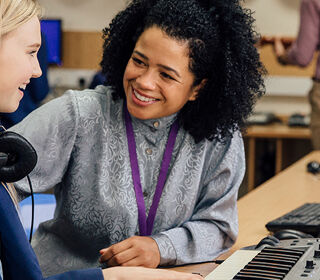
Blog Article

Birmingham City University's B-MERG cluster has conducted extensive research with leading group Birmingham Music Education Partnership to assess the music education pupils in primary and secondary schools receive.
Researchers:
- Martin Fautley
- Victoria Kinsella
- Adam Whittaker
Research background
As a leading research centre for music education, our research cluster B-MERG works closely with Birmingham Music Education Partnership (BMEP). BMEP is one of 120 music education hubs nationally, funded by the Department for Education and reporting to the Arts Council England. BMERG is a member of the BMEP partnership group, and undertakes research evaluation projects as commissioned by Services for Education (S4E), the lead organisation in the BMEP hub.
Research aims
BMERG has worked with BMEP on a variety of projects. These have included a survey of both primary and secondary schools, undertaking an analysis of provision which highlights the status of music education in schools across Birmingham and identifying some of the challenges. This has been used by S4E in its development work with schools. BMERG has also developed thinking on musical inclusion, investigating the practices of teachers working in diverse and challenging contexts. The subsequent publication Musical Inclusion (Kinsella, Fautley and Gray 2018) offered insight into pedagogical approaches and strategies perceived to increase success for learners. Ongoing work includes the development of continuing professional development for primary music coordinators and secondary music teachers and assessment in musical contexts.
How is the research being carried out?
Anonymity of participants formed consistent ethical parameters and input options included free text response. Data was also gathered in the form of practitioner vignettes for musical inclusion work which conformed to the British Education Research Association guidelines on ethical practice.
Funding
£15,000
Results
Published findings consisted of two research reports.
A selection of some of the key findings from the secondary school music service survey were:
- Most respondents said they had a level of freedom with their music curriculum
- 70 percent self-reported that they are a musical school, which means they are potentially a good progression route for primary schools
- Most secondary schools have more than one music teacher, but a number of them have to fill their timetables with other subjects
- Most (85 percent+) KS3 Music lessons are approximately one hour per week, although carousel timetables mean that sometimes this is spread across other arts subjects
- 35 percent reported they have a telescoped KS3, meaning they only teach music to Years Seven and Eight, as GCSE subjects start in Year Nine
- On average there are 20-24 pupils per Year 10 class
- Of 22 schools responding to the survey, eight are not currently operating A Level music groups music in either Years 12 or 13
- Schools that do offer music at A Level have group sizes of between one-to-five pupils
- 15 out of the 22 schools are running GCSE/ 6 BTEC courses
- Extracurricular music is offered across the majority of schools, and this is voluntary. Choir is the most popular but the offer is varied. 11 out of the 20 schools do musicals and shows.
- 76 percent of respondents say they have attended a BMEP network event
- 55.6 percent of respondents report that they believe their CPD is adequate.
- 80 percent of respondents stated Services for Education provision is very effective
- Many music teachers comment that they have poor facilities and limited resources
A sample of some of the key recommendations given as extracts for the research project on musical inclusion were:
1. Longer lessons. For those delivering instrumental lessons 30 minutes may be the minimum. Be aware that response time may be slower, leaving gaps or space is essential. More time will also allow you to break the lesson into (more) shorter activities, for those who need this approach.
2. Give time and space to your pupils with SEND. Particularly those with more profound needs. Wait, wait and wait again.
3. Know your students. Collect as much info about your pupils BEFORE lessons start and also get to know their likes or dislikes, any sensory issues and/or particular motivations.
4. Motivations in particular can come in really handy with those who display challenging behaviour. Liaise with teachers, Sencos, parents, carers, to build up a picture of the learner, and discuss appropriate aims.
5. Instruments. Think about the instruments; can the students access them? Is there a physical barrier to music making? How can this be removed? Could an adapted/electronic version be created/found?
6. Persevere. If your student(s) are not engaged or accessing the lessons immediately don’t be deterred - again time is important and some students will need extra time to get to know you, the instrument, and the class/context. Consistency and routine over time will be particularly important to enable these learners.
7. Don’t be afraid to ask for help or support. If you are in a teaching situation where you
feel you are out of your depth, or like you no longer have control, or some children are just not learning or accessing your lesson, for any reason, don’t be afraid to ask for help.
8. Be clear. Some children and young people with additional needs need very simple, clear instructions. Make sure that you do not over complicate instructions. Being literal can also be useful. Think about colloquial speech, “It’s raining cats and dogs”, “is it, I can’t see any, where are they?” Speak in a way that is clear to all of the students in your class. Also, don’t talk too much when the children could be playing their instruments. Ofsted talked of music being the ‘target language’; is it in your lessons?
Publications
Fautley, M., Kinsella, V, Whittaker, A. (2018). Birmingham Music Hub Primary School Music Teachers Survey 2018
Fautley, M., Kinsella, V, Whittaker, A. (2018). Birmingham Music Hub Secondary School Music Teachers Survey 2018